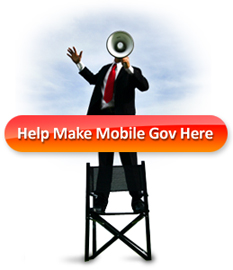
Mobile technology is changing the way people find and use information and services. How does government interact with the public in this anytime, anywhere world?
This Making Mobile Gov Project is helping agencies work together to make a more open, innovative government to meet 21st century citizen expectations.
- We are starting by helping you discover information and make the case for mobile in your agency.
- Next, we want you to join in and discuss the challenges to mobile gov.
- Third, we will have a dialogue with people in government, industry, nonprofits, and the general public on how to design this mobile future.
Based on your input, we’ll launch a community-generated wiki with tools to help you build and implement a mobile strategy for your agency and to share resources among agencies.

Mobile has been called transformative for healthcare, commerce, development and education. Mobile will be transformative for government, too.
The widespread use of mobile devices--96 percent of 18- to 29-year-olds own a cell phone--signals changing needs and expectations of the public. The federal government must deliver services and information always, anytime, anywhere. Many agencies are already pushing the government’s adoption of consumer mobile services. We are calling this shift Mobile Gov.
The case for Mobile Gov is driven by:
- the ubiquity of mobile use in the U.S.
- opportunities to use mobile to improve the efficiency of service delivery in government.
- innovations in mobile that can propel new government services/service delivery.
- improved transparency through increased access to government data and information.
The shortcut to this page is www.gsa.gov/makingmobilegov.

















